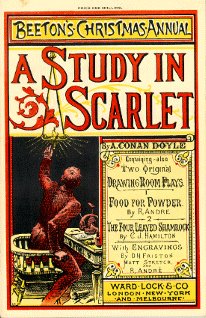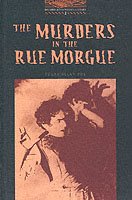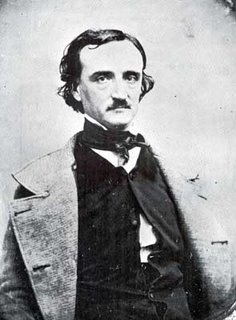"The Murders in the Rue Morgue" v. "A Study in Scarlet"
After reading the first Sherlock Holmes adventure, "A Study in Scarlet," I decided to go back and reread "The Murders in the Rue Morgue." Edgar Allen Poe wrote "The Murders in the Rue Morgue" (1841) forty-six years before Sir Arthur Conan Doyle published the first Sherlock Holmes novel (1887). I wanted to know the difference between a detective story that took place
 during the first half of the 19th century compared to a detective story that took place at the end of the 19th century, I wanted to know if Doyle was able to perfect the genre Poe had created, and I wanted to know if Sherlock Holmes could kick C. Auguste Dupin's ass. If this were the one-hundred years war and the two met on a battlefield would the tall and lanky Holmes decapitate Dupin's Frenchified noggin, or would Dupin deduce his sword all the way into Holmes's gut? Right here and right now I'm going settle the centuries of war between the English and the French based on two short stories: one written by a Brit and the other by an American. Well, maybe not quite, but I am going to determine which story is better based on five categories: each author's biographical low point, the writing style, the sidekick, the greatest moment of deduction, and, finally, the detective itself.
during the first half of the 19th century compared to a detective story that took place at the end of the 19th century, I wanted to know if Doyle was able to perfect the genre Poe had created, and I wanted to know if Sherlock Holmes could kick C. Auguste Dupin's ass. If this were the one-hundred years war and the two met on a battlefield would the tall and lanky Holmes decapitate Dupin's Frenchified noggin, or would Dupin deduce his sword all the way into Holmes's gut? Right here and right now I'm going settle the centuries of war between the English and the French based on two short stories: one written by a Brit and the other by an American. Well, maybe not quite, but I am going to determine which story is better based on five categories: each author's biographical low point, the writing style, the sidekick, the greatest moment of deduction, and, finally, the detective itself.Author Low Points
Not much is known about Edgar Allen Poe's life, and much of the myth is actually a series of lies told by his former publisher. Perhaps the low point of poor Poe's life are the circumstances surrounding his death. After having several drinks at a friend's birthday party he disappeared for three days and later winds up dead in a gutter. Probably not the most noble death but it does combine his preternaturally strong love of alcohol and gutters.
Sir Arthur Conan Doyle was a standup British gentleman who famously defended Great Britain's involvement in both the South African War and World War I (talk about having your head up the Queen's arse in order to get knighted). Unfortunately, Doyle did not share Holmes's deductive skills. Doyle was later duped into believing the stories of the famed Cottingley Fairies thanks to some photographic trickery. The culprits of this hoax: two sisters, one aged ten and the other sixteen. D'oh! Doyle even claimed that Houdini was magical even though the escape artist himself claimed otherwise.
 Author with the lowest low: Sir Author Conan Doyle (which makes him the loser in this category). A ten-year old and a sixteen-year old! Moriarty could have figured this mystery out. Check out the pictures and see what you think: http://www.lhup.edu/~dsimanek/doyle.htm. Pretty crafty for a couple of girls who would soon be taught to "lay still and think of England," don't you think? Besides, Poe's death is almost cool. It's kind of John Bonham before John Bonham.
Author with the lowest low: Sir Author Conan Doyle (which makes him the loser in this category). A ten-year old and a sixteen-year old! Moriarty could have figured this mystery out. Check out the pictures and see what you think: http://www.lhup.edu/~dsimanek/doyle.htm. Pretty crafty for a couple of girls who would soon be taught to "lay still and think of England," don't you think? Besides, Poe's death is almost cool. It's kind of John Bonham before John Bonham.The Writing
Edgar Allen Poe's prose is masterful as always. It has this wonderfully archaic quality to it that can never be reclaimed. Absolutely gorgeous. It is interesting to note that a good deal of the story is in the form of Dupin discussing his deduction of the crime. This theme of a story within a story appears several other times within Poe's work. You can also find it in "The Oval Portrait."
Doyle isn't quite as masterful with words as Poe, and perhaps this is why he isn't the canonical God that Poe has become. In fact, Doyle drops a couple of real clunkers when he writes. At one point he describes a group of Mormons as traversing "every impediment which Nature could place in the way, with Anglo-Saxon tenacity." Wow, that's bad writing. Maybe it sounded good before WWII, but it's the kind of line that ages worst than Ed Wood's special effects. Nowadays Doyle's sentiments strike the tone of being more than a little racist and awkward.
Best overall writing: no contest, Poe wins. Doyle can write an entertaining yarn, and knows how to create suspense, but his prose is nowhere near the level as Poe's.
The Sidekick
In both works the sidekick is the narrator of the story, and while we are given a sizable introduction to Moriarty, the unnamed sidekick in "Murders in the Rue Morgue" is not given a name. Poe does not tell us much about the sidekick except what is important for the story. He seems to possess some wealth, is staying in Paris for enough time to gain residence there, and encountered Dupin while looking for the exact same book at a library. The two talk about their situation and decide to rent out a place together, and, in typical Poe, they get a mansion that's rumored to be haunted.
Moriarty, on the other hand, is a physician who is returning from the Afghanistan war after sustaining some wounds. He calls himself a lazy man and decides to seek out a roommate after he realizes that he's been living beyond his means. Moriarty is a great means of introducing us Sherlock Holmes and his deductive techniques.
Best sidekick: Moriarty wins. We really don't get to know Poe's sidekick all that well, and Moriarty just works as a better foil to Sherlock Holmes. I have to look up to anyone who describes himself as lazy. It is odd, however, that both sidekicks decide to be roommates with the famed detectives (as we speak several Brokeback Baker St. and Murders at the Brokeback Morgue parodies have suddenly been posted online).
Greatest Moment of Deduction
Both of the most impressive moments of deduction occur as we're first introduced to the respective detectives. The moment Moriarty and Holmes meet the detective comments that Moriarty must have recently come from Afghanistan. A chapter later, he explains how he came to this conclusion: "The train of reasoning ran, 'Here is a gentleman of a medical type, but with the air of a military man. Clearly an army doctor, then. He has just come from the tropics, for his face is dark, and that is not the natural tint of his skin, for his wrists are fair. He has undergone hardship and sickness, as his haggard face says clearly. His left arm has been injured. He holds it in a stiff and unnatural manner. Where in the tropics could an English army doctor have seen much hardship and got his arm wounded? Clearly in Afghanistan.'" Impressive, impressive.
As the narrator and Dupin stroll down a Paris street without talking for fifteen minutes Dupin responds to the narrator's thoughts, "He is a very little fellow,varieties true, and would do better for the Theatre des Varietes." After the narrator unwittingly responds he does a double take (well, it doesn't say he does a double take, but he must have done a double take, and a spit take too) and inquires how Dupin knew what he was thinking about. The narrator was in fact thinking about a wannabe actor by the name of Chantilly who was attempting to play the role of Xerxes. Dupin reveals that he noticed a fruiterer bump into the narrator causing him to trip on some lose stones, and in turn forced him to examine the causeway more carefully. Soon the two of them came upon a road paved in a manner called "stereotomy" which the narrator noticeably muttered. Dupin deduced from stereotomy that the narrator would have to think of the Greek theory of atomies which lead to Epicurus. When the narrator looked towards the Orion constellation Dupin was certain he was on the right track. Knowing that there was a reference to Orion in a review of Chantilly's latest
 performance Dupin surmised that the narrator's thoughts must have finally fallen on this final topic, and responded to his thoughts. Once again, this is rather impressive.
performance Dupin surmised that the narrator's thoughts must have finally fallen on this final topic, and responded to his thoughts. Once again, this is rather impressive.The winner of the greatest moment of deduction: Dupin. Sure, Holmes is smart, but Dupin deduced someone's very own thoughts. That's pretty fucking cool. What's interesting about Poe's idea of deduction is that even though he attempts to give us a definition of the deductive faculties, it ends up seeming more like a supernatural power. The deductions that Dupin can make are often impossible. Holmes, on the other hand, was a character created in the thick of the industrial revolution when science was leaping forward, and therefore all of his deductions are merely improbable. Poe has the luxury of outpacing science while Doyle is shackled to reason. Holmes calls Dupin's act of deduction jealous and superficial,'" but we all know that he's really just jelouse.
The Detective
There are a couple of surprises in store for anyone who has never actually read a Sherlock Holmes story. One of the most surprising things about Sherlock Holmes is how prissy he is. When Moriarty gives Holmes a compliment, he describes Holmes as responding with some sort of giddy pride. Who would have guessed that an Englishman could be more feminine than a Frenchman? Another surprising characteristic is that outside of knowledge needed for deduction Holmes is a complete dunce. He had absolutely no idea that the Earth revolves around the Sun. He explains to Moriarty that if he were to fill his head with too much that essential knowledge might fall out.
Much like his sidekick, we don't learn much about Dupin. The narrator tells us that he comes from aristocratic roots, but that his family wealth has been all but squandered. That's about it. Unlike Holmes, Dupin knows just about everything and possesses an almost supernatural intellect. However, he does lack any giddy pride.

The winner of the greatest detective: Holmes. Sure, he can be really annoying sometimes, but someone who has fatal flaws is far more interesting than someone who is flawless. I can't speak about Dupin's further adventures (perhaps he becomes more interesting as Poe refines his character), but as far as the first adventure goes Holmes is the more fully fleshed out and interesting character.
However, this only gives "A Study in Scarlet" two points and "Murders in the Rue Morgue" three. Poe seems to have bested Doyle in this round, but just like the adversaries in their stories, I feel they will return to face each other once again.
"A Study in Scarlet": 2 "Murders in the Rue Morgue": 3.
No comments:
Post a Comment